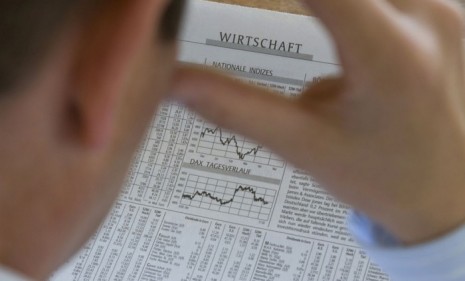The Fed's bleaker jobs forecast: What's changed?
The Federal Reserve is less optimistic about the economy and jobs than it was in April. Commentators offer 3 theories on what's different now

A free daily email with the biggest news stories of the day – and the best features from TheWeek.com
You are now subscribed
Your newsletter sign-up was successful
The Federal Reserve is less upbeat about the economy and job market than it was in April. The minutes from the Fed's June 22-23 meeting, released Wednesday, project that unemployment levels will remain slightly higher than projected and that the GDP will grow a bit slower. What's behind the Fed's gloomier outlook? Three theories: (Watch a Bloomberg discussion about prior economic outlooks)
1. Blame Europe
In most ways, the Fed's June analysis actually wasn't too different from its April one, says Carl Gutierrez in Forbes. But issues in Europe, specifically the Greek-fueled sovereign debt crisis that "flared up" in between the two most recent meetings, has made financial conditions "less supportive of economic growth on balance."
The Week
Escape your echo chamber. Get the facts behind the news, plus analysis from multiple perspectives.

Sign up for The Week's Free Newsletters
From our morning news briefing to a weekly Good News Newsletter, get the best of The Week delivered directly to your inbox.
From our morning news briefing to a weekly Good News Newsletter, get the best of The Week delivered directly to your inbox.
2. Blame tight-fisted shoppers
Consumer spending, which accounts for 70 percent of U.S. economic activity, grew at a zippy pace in the first three months of 2010 — and then slumped after the Fed's April meeting, as shoppers grew concerned about high unemployment, the roller-coaster stock market, and the depressed housing market. "Clearly, the consumer is being more cautious now," says Standard & Poor's chief economist David Wyss. The good news, he adds, is that consumers with jobs are finding great bargains.
3. Blame the tight-fisted Fed
The Fed's analysis and response is "totally baffling," says Matthew Yglesias in Think Progress. Inflation is below their target rate, and falling, and economic growth and employment are weaker — yet they've "decided that the appropriate response is... nothing." That's "crazy." They should be "printing money and dropping it from helicopters," and telling people they're trying to raise prices to the target inflation rate, because that's how you "make monetary stimulus work."
A free daily email with the biggest news stories of the day – and the best features from TheWeek.com
-
 Political cartoons for February 18
Political cartoons for February 18Cartoons Wednesday’s political cartoons include the DOW, human replacement, and more
-
 The best music tours to book in 2026
The best music tours to book in 2026The Week Recommends Must-see live shows to catch this year from Lily Allen to Florence + The Machine
-
 Gisèle Pelicot’s ‘extraordinarily courageous’ memoir is a ‘compelling’ read
Gisèle Pelicot’s ‘extraordinarily courageous’ memoir is a ‘compelling’ readIn the Spotlight A Hymn to Life is a ‘riveting’ account of Pelicot’s ordeal and a ‘rousing feminist manifesto’